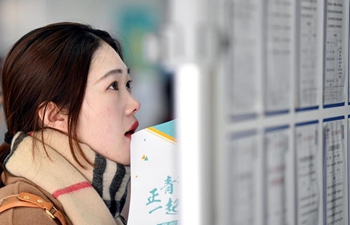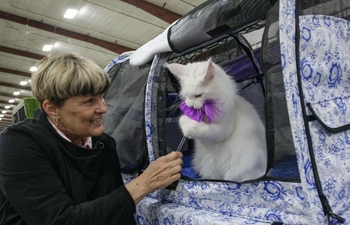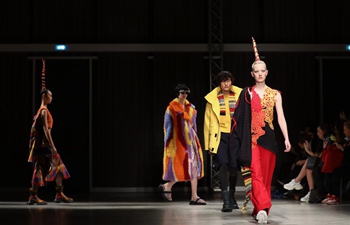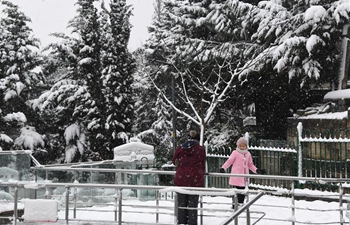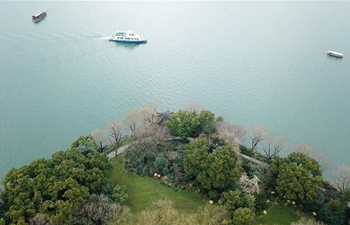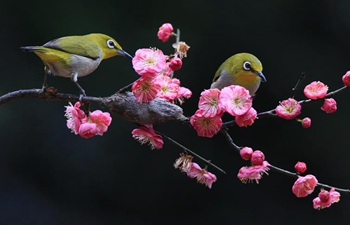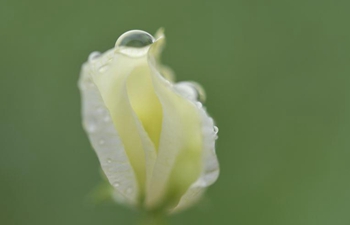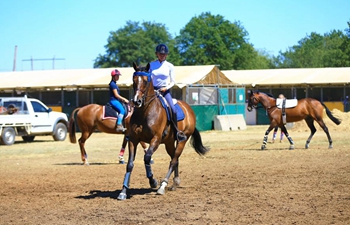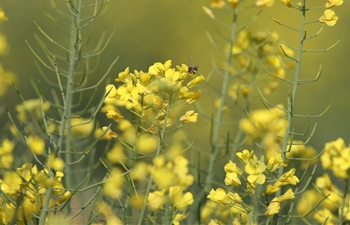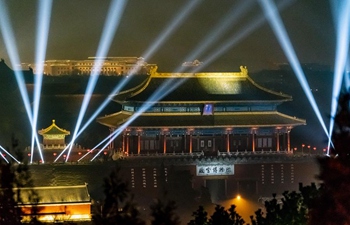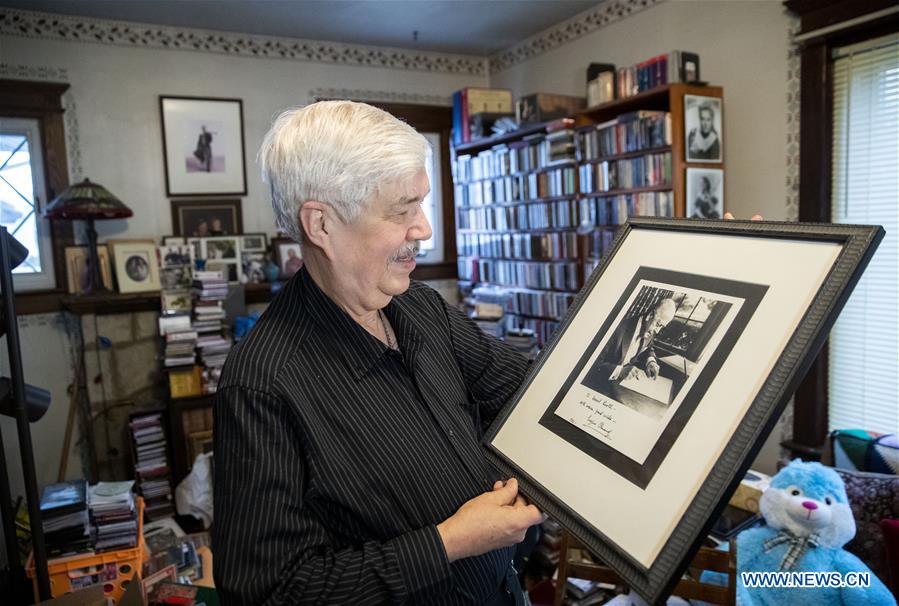
Davyd Booth, a violinist and second keyboard player with The Philadelphia Orchestra, looks at a photo of Eugene Ormandy, the orchestra's former music director, at his home in New Jersey, the United States, Jan. 29, 2019. More than 45 years after his first trip to China, Davyd Booth, a 69-year-old U.S. musician, still clearly remembered his feeling at the time. (Xinhua/Wang Ying)
By Xinhua writers Pan Lijun, Zhou Saang, Wang Ying
NEW YORK, Feb. 25 (Xinhua) -- More than 45 years after his first trip to China, Davyd Booth, a 69-year-old U.S. musician, still clearly remembered his feeling at the time.
"It was almost like we were going to a different planet," said Booth, a violinist and second keyboard player with The Philadelphia Orchestra.
Playing a Yamaha piano at his home in New Jersey, Booth had been practicing a composition for a collaborative concert with Chinese musicians.
"That was an incredible mind-blowing experience," he said, recently recounting to Xinhua his 1973 trip to China.
HISTORIC TRIP
When young Booth read about China in schoolbooks and saw pictures of rice paddies, boats and ancient Chinese architecture, his curiosity arose and he "really envied the Chinese people" for having a history of several thousand years.
Booth hadn't had the chance to visit China until he joined The Philadelphia Orchestra when he was 23.
In 1973, at the invitation by then U.S. President Richard Nixon, his orchestra became the first American orchestra to visit the People's Republic of China -- a trip considered a key part of Washington's rapprochement with Beijing in the 1970s.
That trip was significant "on several different levels: historically, musically, probably most importantly, diplomatically," said Booth, who said he felt honored to have taken part.
It was made possible by enormous joint efforts by Nixon, the renowned diplomatic figures Henry Kissinger and Nicholas Platt, and Eugene Ormandy, the orchestra's music director, according to the veteran musician.
UNEXPECTED CALL
Booth attributed his becoming a member on the cultural mission to China to "an incredible amount of good luck."
"At the very last minute I got a call (which) said that somebody had gotten sick and so they wanted me to go," he said.
"What a way to start a new job by going to a country like China!" exclaimed Booth while recalling that experience.
In order to be in good shape professionally in China, he said, he had spent more hours in practicing before departure in 1973.
EYE-OPENING EXPERIENCE
The musically talented Booth made his professional debut at the age of 13, but he couldn't help marveling at the artistic accomplishments displayed by the Chinese musicians in interactions during that trip.
"China, even at that point, had a very strong connection with western classical music, and the caliber the musicians had was already really phenomenally high," noted Booth, commenting on the Yellow River Concerto performed then by the Chinese artists as "fabulous."
"Chinese musicians are on an incredibly high level. Each generation builds on the last generation," he added, on collaborating with different generations of Chinese artists over the past 46 years of his tenure in the orchestra.
Calling the 1973 trip to China "two weeks of discovery," Booth remembered almost every "surprise" and "interesting moment," such as being introduced to traditional Chinese instruments and tasting Chinese cuisine.
Moreover, "there were already quite a few people at that time that spoke English in China," while "there was nobody in our orchestra who spoke Chinese."
It was also a wonderful experience to see the things described in books, such as the Great Wall. "I never dreamed that I would get to see something like this," said the longtime fan of Chinese history and culture.
"There were very few cars. I've never in my life seen so many bicycles ...it would look like a sea of bicycles," described Booth of his sight of Beijing's streets.
The Chinese people all looked very much alike, wearing the same type of clothes and caps, and of pretty much the same color, he continued.
"The next time we were there was in the early 1990s. And then it was totally different ... I've never seen a country change so much and build itself up so quickly and so impressively," said Booth, who is one of only four members of the 1973 trip who remain in the orchestra.
LASTING FRIENDSHIP
The Philadelphia Orchestra, which was founded in 1900, has a long and distinguished history of touring the world. It is one of the most-traveled U.S. symphonic ensembles.
Twenty years after its first visit, the full orchestra returned to China in 1993.
The orchestra enjoys a longstanding partnership with the National Center for the Performing Arts in Beijing and the Shanghai Oriental Art Center. In addition, it has worked with the Shanghai Philharmonic Orchestra since 2016 in advancing cultural exchanges between the United States and China.
"Our relationship with China has been one of our strongest and one of the most continuous and one of the longest," said Booth, who has participated in about a dozen performances in China.
"It's a living relationship to enjoy," said Booth, while stressing the importance of people of different cultures communicating and interacting with each other through the universal language of music.
The Philadelphia Orchestra announced in late January that this year it will visit China on May 16-28 -- the orchestra's 12th tour to China -- to mark the 40th anniversary of U.S.-China diplomatic relations.
People-to-people connection is vital to further cementing bilateral ties, said the orchestra's senior adviser Platt, who helped make possible the orchestra's 1973 visit to China.
"The orchestra's 40-plus years of trusted partnership with China is helping to keep the two peoples together," the former U.S. ambassador told Xinhua.
